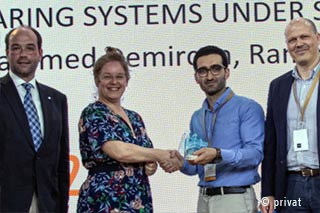Success for the Cologne Institute for Information Systems (CIIS): At the 30th European Conference on Information Systems (ECIS), Muhammed Demircan, Ramin Ahadi, and Prof. Wolfgang Ketter won the renowned Claudio Ciborra Award for the best innovation paper.
The three researchers from the WiSo Chair of Information Systems for Sustainable Society (Chair Prof. Wolf Ketter) received the award for their research paper "Sustainability vs. Price: Analysis of Electric Multi-Modal Vehicle Sharing Systems under Substitution Effects". In this paper, they investigate how possible interventions in demand management affect the economic and environmental performance indicators of free-floating-shared-vehicle-(FFVS) platforms.
Such platforms allow users to rent different vehicles according to their needs, which has become an almost self-evident part of urban mobility for many people. That is why, they play an important role in paving the path to sustainable mobility. The entire process, from searching to renting to paying, is usually handled via an app.
With a multi-agent simulation, Muhammed Demircan, Ramin Ahadi, and Wolfgang Ketter succeeded in quantifying the effects of demand management interventions on the profitability and the ecological footprint of FFVS providers. They focused on two items: the user's flexibility and their willingness to pay a premium for more environmentally friendly vehicles. The researchers calibrated their simulation with rental data from Berlin free-floating-vehicle-sharing platforms. Beyond the results, the WiSo-researchers provide a conceptual framework with this model that makes it possible to simulate the behaviour of shared mobility users and operators and thus the effect of possible controlling interventions.
In terms of content, the study shows, that it is economically and environmentally disadvantageous to simply increase the flexibility of users in their choice of transport modes, as users tend to prefer vehicle options that are generally cheaper. In the current market environment with rental prices per minute, for example this is a shared car for most trips because it can usually go faster than a scooter.
On the one hand, with a price-sensitive population, if users are more flexible to choose among different modes of vehicles, the service quality improves because the customers are freer to choose their means of transport. However, the substitution effect leads to users renting more (cheap) cars and fewer (profitable) scooters. The total profit for the operators thus hardly increases, while the ecological costs for society increase.
On the other hand, the simulation also showed that this picture reverses as soon as users are willing to pay a surcharge for renting more environmentally friendly vehicles. From the fleet operators' point of view, it is therefore also attractive from an economic perspective to engage in incentive mechanisms to encourage users to choose more sustainable but also more expensive vehicles, as this will significantly increase their overall profit.
- ECIS 2022 Research Paper No 162. "Sustainability vs. Price: Analysis of Electric Multi-Modal Vehicle Sharing Systems under Substitution Effects".
- Cologne Institute for Information Systems (CIIS)
- European Conference on Information Systems (ECIS) 2022
- Chair of Information Systems for Sustainable Society
